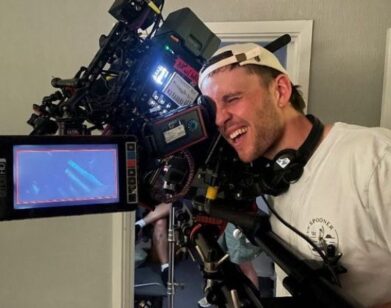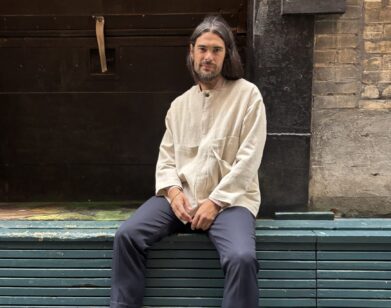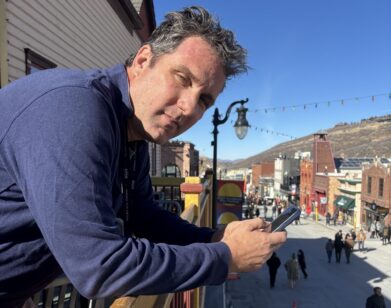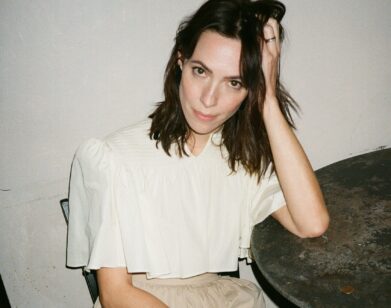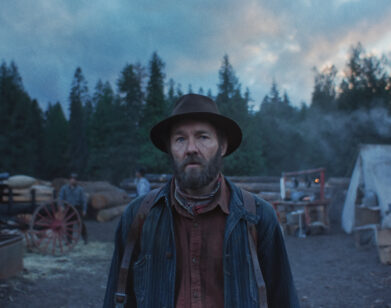in conversation
Siân Heder Tells Laverne Cox How She Made the Year’s Biggest Crowd-Pleaser
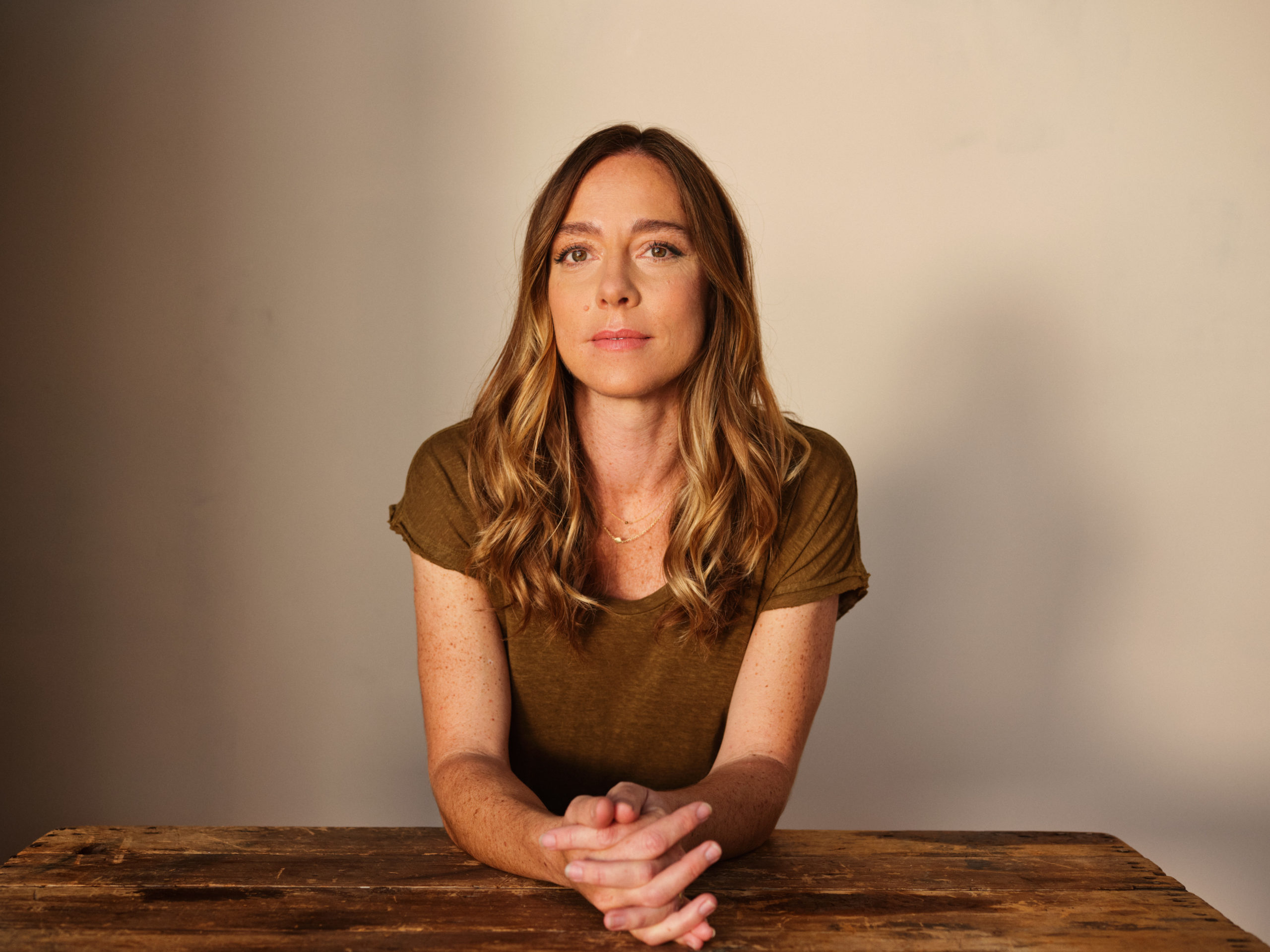
Courtesy of Apple.
Here’s a helpful tip when watching CODA: Bring Kleenex. Siân Heder’s latest movie is the kind of crowd-pleasing tearjerker that can inspire a tech giant to shell out record-breaking sums of money for the opportunity to stream it on one of its platforms. That’s exactly what Apple did earlier this year, when it paid $25 million for the rights to the coming-of-age story after its premiere at the Sundance Film Festival. The appeal of Heder’s second feature (her debut was the 2016 drama Tallulah) is undeniable. CODA, which stands for “child of deaf adults,” follows Ruby Rossi (Emilia Jones, in a star-making performance), the hearing teenage daughter of deaf parents. Along with her brother, who is also deaf, Ruby’s life has been devoted to helping her family’s fish business in Gloucester, Massachusetts. But she’s also a knockout singer, and once she’s given the chance to pursue those dreams, she must choose between her family and following her own path. What follows will leave you ugly-crying. But don’t take our word for it. Laverne Cox, who got to know Heder when she was a writer on Orange Is the New Black, recently spoke to the filmmaker about all of the elements that went into creating one of the year’s most lovable movies. —FRED SAHAI
———
LAVERNE COX: How many kids do you have now?
SIÂN HEDER: I have two kids. I have a five-year-old son and a seven-year-old daughter.
COX: I believe you were pregnant during the first season of Orange [Is the New Black], if your oldest is seven.
HEDER: I was pregnant in season two or three. Tallulah got greenlit and I went to Jenji [Kohan, creator of Orange Is the New Black] to tell her that I needed to leave to go shoot the movie. And she was like, “That’s okay, go shoot the movie and come back when you’re done.” And I was like, “Oh, I’m also pregnant and I’m going to be giving birth right when I finish this movie. So I don’t know if I can come back.” Lots of movie-making and baby-making at the same time.
COX: I finally watched Tallulah. I have to apologize for just getting around to it, but I’m so grateful that I did because it’s so good. So I’m just thinking about you being pregnant and making Tallulah, which is about a baby kidnapped by Elliot Page. What was interesting for me about the mother is that she is very unsympathetic at the beginning of the film. And then when Tallulah snatches the baby, it’s like, thank god. But then you see the mother devastated and you feel for her, because even in her dysfunction as a parent, she still loves her child. She might not be doing it well, but there’s still the love there. It’s really interesting, because CODA is obviously an adaptation of the French film La Famille Bélier, but I feel like there are themes that coincide with Tallulah. Do you feel like there’s a relationship between Tallulah and CODA? The title CODA stands for children of deaf adults, but I didn’t know that before I watched the film. I immediately thought of a musical coda, the conclusion of a musical piece or of a dance. And then I also thought about codependency.
HEDER: Yes. The title had this double meaning because there’s a lot of music in the film and not only does it mean child of deaf adults, but I love that it signifies the ending of a piece of music that sums it up and brings it to a close. And to me, it’s a story about the end of childhood, when you are finding yourself and trying to discover who you are outside of the bubble of your family. But then, the other day, someone was like, “Isn’t this like codependency anonymous?” And I was like, “Oh, another apt term.” Because in a way, the story is about enmeshment, too. I think it’s about the way boundaries can be crossed in a family. This is not the experience of every CODA by any means, but I do think that particularly in deaf families, when they live in a small town and they’re working class and they don’t have means and hospitals, there is a reliance on family and favors and friends. So yes, that last meaning of CODA was a new one for me. I have not been to codependency anonymous, but maybe I should.
COX: I was in a codependent relationship for many years that taught me a lot. So I’ve been aware of CODA for many years.
HEDER: But to answer your question about themes, you’re right. I’m always telling stories about family at their core. Jenji Kohan created Orange, and in a way, that whole show is about family. On Little America, which I work on now, the ways family makes us and supports us and showers us with love, but can also be limiting in certain ways, is a big theme. I just spent a month with my family in Gloucester, and we were all staying in the same house, and my husband was just looking at me and my personal family, and said, “Can one fucking person walk the dog without five people going with that person? You guys do everything together.” It was interesting to have him call that out about my relationship with my immediate family, because I don’t know where that dynamic came from, but my parents are immigrants. My dad was a refugee.
COX: Immigrants from where?
HEDER: My dad’s from Hungary and my mom’s from Wales. My dad was a refugee and came here with nothing, He escaped during the war with his immediate family. Family is everything to him. If it were up to him, we would all be in a room together. No one would ever leave. We’d be sleeping like dogs in a pile on the ground. So that is something that definitely shaped me. I’m always circling that as a storyteller.
COX: My first ugly cry watching the film was when he put his hands on her throat to feel that vibration of her singing. That was so insanely beautiful. Can you talk to me about that scene and the moment in the recital to when everything goes silent and we experience the recital, the way the Rossi family experiences it?
HEDER: The singing scene was interesting, because it was in the original film. And in that film, the actors were hearing and they were playing deaf, so when I watched that scene I knew that it was a hearing person pretending to be deaf, but they were hearing the singing and having an emotional response to it. When we shot that scene with Ruby and her father, I asked Troy [Kotsur] very early on, “Are you getting anything from putting your hands on her neck?” And he was like, “No, not a fucking thing.” And I was like, “Oh, is this scene bullshit?” If he’s actually not getting anything, vibrations, then, is this a hearing person’s perspective of that the deaf person can magically get music through this transference? So Emilia [Jones]’s task was to go loud enough to make Troy feel something. And Troy’s task was to work with Emilia to move his hands around, to find it with her. And what it created in the scene was this incredible collaboration where it wasn’t just the characters having this moment. It was the actors having this moment. Troy has a CODA daughter who was the same age as Emilia. He was away from his daughter. She was away from her dad. I think they bonded immediately. And they had a very, very close relationship and they kept losing it in the scene together. And Emilia told me that at one point Troy said, “I really wish that I could hear you right now because I would love to hear your voice.” And one of my favorite moments is actually at the end where she looks at him like, “Did you get it?” And he makes a face like, “Not particularly, but it doesn’t matter.” He got what he needed, which was to understand her.
COX: Sometimes it’s about the effort. We don’t always get each other as human beings, but the effort to just try to see each other and the vulnerability of that is sometimes enough.
HEDER: I love that you’re saying that, because I keep getting asked, “What do you hope people take from this film?” And to me, it’s that. We are in a time where people don’t always get each other. And I think movies are empathy-making machines. If you laugh with someone and cry with them and take a journey and feel what it is to be in their family, you come out just a little more open as a human, to an experience that is not your own.
COX: I have to ask you about the great Marlee Matlin. I have such reverence for her as an artist. She’s everything. And she’s fucking hilarious in this movie.
HEDER: She’s hilarious in real life. That’s the first thing I thought when I met her is, “Oh, you are funny as shit. You’re my people.” She just walked in and dropped four F-bombs in the first two minutes of meeting each other. And I was like, “I love you.”
COX: I have to ask you two more questions, at least. Emilia, the star of your film—I know there was an exhaustive audition process. What is required of her as an actor is tremendous. And I know she didn’t sign before. I know she’s British. I forget how old she is. She’s incredible in this. And she has a beautiful voice.
HEDER: She was 17 when we shot.
COX: Oh my god. What a talent.
HEDER: It was exhaustive. I would say we left no stone unturned in our search. We looked for a real CODA. That was my instinct. But then we had to find the singing voice in that person as well, which was very important for the film, because you’re selling that this teacher pulls her out of a crowd and there had to be something in her singing that would make that happen. And she’s also in every scene in the movie and it’s drama and comedy and she’s had to go out on fishing boats and learn to fish. And then on top of it, yes, she was British. And she was an incredible singer and she had never had a singing lesson. So it was just her raw voice.
COX: That’s perfect, though.
HEDER: It was perfect because you can’t untrain a trained voice. So there was something beautiful where she just had this tone to her voice that was so organic. She was having cathartic vocal moments on screen. There were a couple of moments where we did a take and something came out of her and she surprised herself with a breakthrough in her voice, which was so cool because you’re capturing it. As a director, to capture an authentic moment on screen is what you really want.
COX: And that leads to my other question. I wanted to ask about hiring deaf actors. There’s a conversation now in the business that I’ve never seen before, about not only who’s in front of the camera, but who’s behind the camera telling the story. There are so many actors with various disabilities who don’t always get opportunities. Can you speak to that? Because it’s such an important thing for folks to see and model how to create a set that is ASL compliant and where the people who are the focus of the story are involved. How important was that to you?
HEDER: There were so many things at play. One is, I was an outsider coming into this community, and I knew that and felt an intense responsibility to surround myself with collaborators that were in the community. So it was important to me not only to hire deaf actors, but to have deaf collaborators on set who were by my side and weighing in. There are things that I wouldn’t catch as a hearing person. It was incredibly creatively important, because when you are representing any marginalized character, as you know, representation can be beautiful, but it can also be harmful. The deaf and disabled community has seen a lot of harmful representation. So there’s a lot of fear when someone is coming in as an outsider who’s not a part of the community. How are you telling the story? Are you involving people from the community? Are you doing your research? Are you being a cultural anthropologist so you know that you’re not perpetuating harmful stereotypes and that you’re actually putting something in the world that moves the conversation forward? So I was really aware going into it. And I have felt that as a writer, my favorite thing about writing is putting myself in someone else’s shoes, especially someone different from me.

